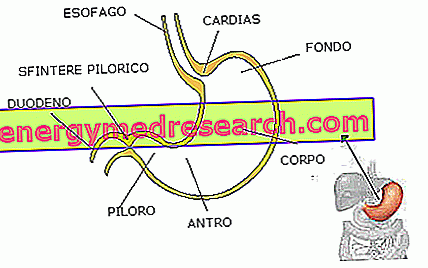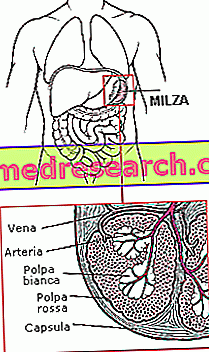Definition
Among the most common and disabling diseases of degenerative dementia, Alzheimer's disease unfortunately plays a leading role: it is a serious disease affecting neuronal cells, typical (albeit not exclusive) of senile age over 65 years. Alzheimer's disease essentially consists in the loss of cognitive functions, such as memory and language.
Causes
The cause responsible for the onset of Alzheimer's disease is unknown to date; however, the clinical evidence is clear: in Alzheimer's disease there is a progressive death of nerve cells, inside which the presence of anomalous helical protein filaments, still under study, is observed.
Symptoms
We cannot describe a specific symptom picture that accompanies Alzheimer's disease: in any case, what all of the affected patients seem to have in common is the phases in which the disease progresses, although the duration of the phase and the intensity of the characteristic symptoms are rather variables. The phases are:
- mild cognitive impairment: slight decrease in cognitive performance
- Mild: progressive amnesia, cognition deficit (memory loss)
- Intermediate: anxiety, dysarthria, difficulty in finding words, spatial disorientation, depression, forgetfulness of names, language difficult to understand
- Advanced: hallucinations, delusions, serious health problems
Natural Care
Information on Alzheimer's Diseases - Drugs for the Treatment of Alzheimer's Disease is not intended to replace the direct relationship between health professional and patient. Always consult your doctor and / or specialist before taking Alzheimer's Disease - Alzheimer's Disease Medications.
drugs
Unfortunately, Alzheimer's disease is one of the neurovegetative diseases for which no specific pharmacological treatment is known: in any case, the drugs used in therapy can lighten the symptoms or in any case prolong the time of the first and second phase of Alzheimer's disease which, as analyzed, are made up of milder and more nuanced symptoms than the severe / advanced phase. Do not forget, however, that no drug has been identified that can block the degenerative pathological trend.
In addition to the administration of drugs aimed at lightening the symptoms (analyzed later) it is essential to implement some simple strategies to improve the patient's quality of life:
- Remove the mirrors: Alzheimer's patients, looking at their reflection in the mirror, tend to be frightened and agitated
- Keep the house in order, possibly removing unnecessary furniture, which could cause confusion for the Alzheimer's patient
- Adapt the living conditions to the needs of the patient
- To stimulate the patient suffering from Alzheimer's disease to a constant physical exercise, very important for the well-being of the person and to remove stress
- Pay attention to the Alzheimer's patient's meal: he tends to forget to eat, because he has no interest in food. Furthermore, the sick should drink plenty of water.
- Do not drink caffeine and do not take nervine substance: patients with Alzheimer's disease, in fact, are already restless, therefore the administration of drinks or exciting foods could create more damage.
In addition to administering drugs to alleviate symptoms, it is recommended to supplement therapy with psychological / psychiatric and behavioral interventions: the purpose of these parallel therapies is not to heal the patient (because as we have seen, an effective cure has not been identified), rather slow down, as far as possible, the normal course of the disease.
Acetylcholinesterase inhibitors : these drugs are indicated in therapy to lighten the symptoms that characterize Alzheimer's disease, and to try to influence the natural course of the disease: these drugs promote the chemical transmission between cell and cell, weakened by Alzheimer's disease. Clearly not without side effects, these drugs can cause bradycardia, diarrhea, nausea and vomiting.
To understand ... Acetylcholinesterase inhibitors increase the amount of acetylcholine in the synaptic space: overcoming the blood-brain barrier, they reach the central snowy system exercising their therapeutic activity.
- Donepezil (eg. Memac, Aricept): to lighten the disorders associated with Alzheimer's disease, initially take a dose of 5 mg, and then gradually increase it after a few days of therapy (usually after a week). For severe forms (advanced stage) the most appropriate dose varies from 10 to 23 mg per day. The dosage must always be established by the doctor based on the severity of the condition.
- Galantamine (eg Reminyl): start the treatment for Alzheimer's disease by taking a dose of 4 mg twice a day (in the morning and at lunch). After an initial treatment-test period (4 weeks), if the previous dose is tolerated by the patient, it is possible to increase the dosage up to 8 mg, to be taken twice a day. After a further four weeks, in the event of therapeutic ineffectiveness, it is possible to increase the dose up to 24 mg / day, to be distributed equally in two doses over a 24-hour period. The drug is also available as slow-release tablets. Consult your doctor.
- Rivastigmine (eg Rivastigmine Teva, Nimvastid, Prometax, Rivastigmine Actavis): it is a reversible drug inhibitor of acetylcholinesterase, of high pharmacological interest. Start the therapy with rather low drug dosages (1.5 mg, to be taken twice a day, for breakfast and dinner), and then gradually increase them at 2-week intervals, up to 3-6 mg / day. Do not exceed 6 mg twice a day. The drug is also indicated for the treatment of Parkinson's disease, another incurable degenerative disease.
- Tacrine: start therapy for Alzheimer's disease with 10 mg of drug, to be taken 4 times a day for at least 6 weeks. The maintenance dose suggests increasing the dose up to 20 mg / 4 times a day. In some Alzheimer's patients it is necessary to increase the dose up to 120-160 mg per day (indicatively, after 12 weeks from the beginning of therapy). Consult your doctor.
Drugs that act on the glutamatergic system : indicated to slow down cognitive deterioration in patients suffering from Alzheimer's disease.
- Memantine (eg Ebixa): the drug is available as tablets or oral solution (to be administered with an oral appliance that releases 5 mg of active per dose). Start the therapy by taking a dose of 5 mg for 7 days, to be taken at about the same time every day. The second week, proceed with 10 mg a day for 7 days; the third week increase the daily dose to 15 mg. The maintenance dose suggests taking 20 mg of the drug a day. If the patient suffering from Alzheimer's disease also suffered from kidney problems, the dose could be reduced. The drug can cause vertigo, the most common side effect.
Antioxidant vitamins : the pharmacological approach with antioxidant vitamins such as vitamin E is innovative, despite its effectiveness is not a common factor for all Alzheimer's patients who have experienced its use. Vitamin E (known as alpha-tocopherol) is ideally able to counteract lipid peroxidation at the level of the membranes of neurons, but numerous scientific studies seem to reject the thesis. However, other studies suggest taking 1, 000 units of the drug (Vitamin E: eg Sursum, Ephynal, Rigentex) orally, twice a day. It should be stressed again that the efficacy of vitamin E for the treatment of Alzheimer's is not yet fully established.
Innovative drugs : among the very many “miraculous” pharmacological proposals we cannot forget the so-called “cognitive stimulants” drugs: by increasing the release of glutamic acid, drugs can ideally favor the complex memorization and understanding mechanisms, thus contributing to improving and stimulating brain activity, damaged by Alzheimer's disease. However, even these drugs do not seem to be completely accepted by the Scientific Community: their therapeutic efficacy is controversial.
However, these drugs are:
- Piracetam (eg. Psycoton, Nootropil): in acute / severe attacks of Alzheimer's disease, it is recommended to take 1-2 vials of 15 mg (containing 3 g of active ingredient) by parenteral route (intramuscular, intravenous or infusion).
- Aniracetam (eg Ampamet): the dose of 1500 mg per day (divided into two doses) is the most indicated for the treatment of symptoms of Alzheimer's disease. The effectiveness of the drug, let us recall again, is still discussed.
Can Alzheimer's disease be prevented?
A difficult question to answer, to which scholars are not yet able to answer with certainty, since the cause that triggers Alzheimer's disease is unknown. In any case, some modifiable elements have been identified, probably able to remove the risk of cognitive degeneration typical of the disease. Following are the key concepts:
- Hypercholesterolemia, in some ways, may be related to Alzheimer's disease; however, the administration of statins for the treatment of high cholesterol does not seem to bring benefits for the prevention of Alzheimer's disease;
- Curcumin (also contained in curry) has proved to be a preventive substance of brain damage in the mouse, due to its anti-inflammatory properties;
- Individuals who, for work or interest reasons, are involved in intellectual activities on a daily basis have a lower risk of contracting Alzheimer's disease;
- Smoking, active or passive, greatly increases the risk of Alzheimer's;
- Practicing sport is a smart practice to better face the day: it seems that sport can in some way benefit the subject, reducing the risk of Alzheimer's;
- The moderate to moderate consumption of red wine can prevent the disease (doubtful hypothesis, verified on a limited number of patients);
- Following a Mediterranean diet, healthy, balanced and free from excess, could probably remove the risk of Alzheimer's disease.



